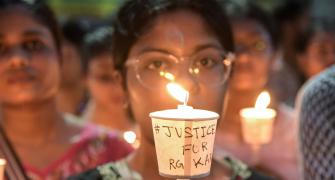Night patrolling on hospital premises and regulating access for people to key areas are among the measures the Centre has asked states to implement to ensure the safety of medics at workplaces, following Supreme Court orders in the rape-murder case of a junior doctor in Kolkata.

The crime at the West Bengal government-run R G Kar Medical College and Hospital earlier this month triggered nationwide protests by residents doctors to press for a central law for the security of health professionals at their workplaces and justice for their peer.
In a letter to chief secretaries and director generals of police on August 23, Union Health Secretary Apurva Chandra drew their attention to the issue of incidents of violence in medical institutions and the recent protests following the Kolkata incident.
Taking suo-motu cognisance of the incident, the Supreme Court delivered orders on August 20 and 22, he said.
In its August 22 order, the court inter-alia directed that "the secretary in the Union ministry of health and family welfare shall engage with the chief secretaries and directors general of police so as to ensure that the state governments/UTs put into place certain basic minimum requirements pending the receipt of the report of the NTF to assuage the concerns of the doctors over their safety at their workplaces".
The Supreme Court-appointed National Task Force (NTF) will formulate a protocol for ensuring the safety and security of doctors and other healthcare professionals.
Chandra said, "It (the top court) has also directed that the state governments shall take remedial and appropriate action given the exigencies of the situation within a period of two weeks thereafter."
"In this regard, the following are some of the immediate measures which can be considered to enhance the security and provide safer working environment for healthcare workers," he said in the letter.
Chandra stressed on display of state laws for healthcare workers' protection and relevant sections of the Bhartiya Nyaya Sanhita along with punitive and penalty details in conspicuous places on hospital premises in the local language and in English.
The letter called for the formation of a hospital security committee and a violence prevention committee, comprising senior doctors and administrative officers as members to strategise and implement appropriate security measures.
It asked them to ensure regulation of access for people and patients' relatives to key areas of a hospital, and stressed on the need for a strict visitor pass policy for a patient's attenders or relatives.
The letter called for a provision to ensure the safe movement of resident doctors and nurses within different blocks, hostel buildings and other areas of a hospital during night duty hours. It asked hospital to ensure proper lighting of all areas of a hospital.
Besides, the letter said, there should be routine security patrolling on hospital premises at night, a 24/7 manned security control room and close liaison with the nearest police station.
It also highlighted that an internal committee on sexual harassment be constituted by hospitals and the condition and requirement of CCTV cameras reviewed.
The ministry is holding a meeting with chief secretaries and director generals of police on preparedness to implement these.









